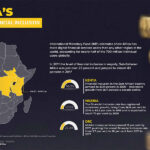BIRD STORY AGENCY
AFRICA’S growing population is projected to become the largest in the world by 2100, with more than 22 million Africans joining the workforce annually.
While this growth is often considered a threat to Africa’s socioeconomic well-being, a new report shows the trend could advantage the continent.
Characterised by an innovative and highly creative youthful population, a World Bank report shows Africa leveraging digital technologies to bridge unemployment and fuel rapid economic growth. Regional integration and climate transition are seen as key drivers of change.
The report, ‘Digital Africa: Technological Transformation for Jobs’ shows regional integration will open up digital markets and avail digital technologies to more African businesses and youths.
However, there is a need for having “a supportive enabling environment at both national and regional levels,” to achieve these.
To create this environment, the authors of the report outline specific gaps that require bridging.
Internet infrastructure gaps and quality issues need to be addressed to ensure that more than the current 22% of the population makes use of the internet.
According to Andrew Dabalen, World Bank Chief Economist for Africa, “closing the uptake gap would increase the continent’s potential to create jobs for its growing population and boost economic recovery in a highly digitalized world.”
The report draws evidence from studies conducted in Nigeria and Tanzania.
“When high-quality internet was available for at least three years, labour force participation increased by 3% in Nigeria, 8% in Tanzania,” the report shows.
Perhaps more importantly, poverty rates in the two countries dropped by 7%. This could be replicated across the continent and the impact could be compounded by regional integration, according to the report.
Cheaper rates make “internet expansion more commercially viable, and support a virtuous cycle of technology-led transformation” according to the report.
Already, regional-level digital technology projects have shown immense potential, with regional blocs playing a vital role.
The East Africa One Network Area initiative launched in 2015 between Kenya, Rwanda, South Sudan, Tanzania and Uganda is one such initiative. Its ‘One Network Model’ ensures common network rates across the region, matching local call rates.
Regional initiatives make bulk buying of submarine (fibre) and satellite internet capacity easier and cheaper, the report notes.
The Smart Africa Alliance is an initiative of 32 countries promoting ICT and broadband services, while the Enhancement of Governance and Enabling Environment in the ICT Sector in the East African, Southern Africa, and Indian Ocean region is another.
In some instances, countries such as Cabo Verde, which cut down charges for international connectivity, have acted unilaterally, while other initiatives support an enabling environment for digital adoption.
ECOWAS’ Data Protection Act and the AU’s Convention on Cyber Security and Personal Data Protection Acts 2014 are two examples ensuring common data policies across regions, while the AU’s Digital Single Market in Africa by 2030 initiative will see individuals and businesses seamlessly access and engage in online activities in line with Africa’s Continental Free Trade Area.
McKinsey Global Institute estimates that 540 million people worldwide will have digital-based work by 2025. Of those, at least 15 million will be in Africa, according to McKinsey. However, what the World Bank report makes clear is that if digital transformation is supported by both government and private sector initiatives, that figure could be much, much higher.














